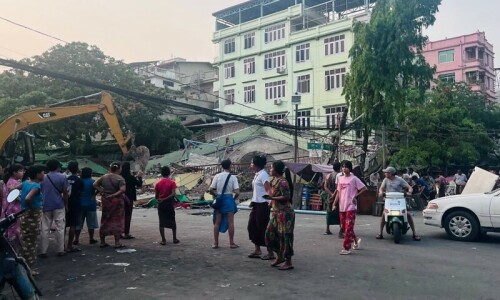KARACHI: Criticising the Drug Regulatory Authority of Pakistan (Drap) over its “highly inefficient operation” adversely affecting patient care across the country and causing losses to importers, speakers on Thursday warned that the country would soon face a health crisis if the registration deadline for imports of all types of medical devices wasn’t extended and the approval process expedited.
They were speaking at a press conference organised at the Karachi Press Club, representing the Healthcare Devices Association of Pakistan (HDAP), Pakistan Chemists and Druggists Association (PCDA), and Federation of Pakistan Chambers of Commerce and Industry (FPCCI).
“The Drug Regulatory Authority of Pakistan had set a registration deadline of December 31, 2024, for medical device imports. Still, as we speak, 6,000 to 8,000 applications are pending for approval with the authority due to which several shipments are stuck at the Lahore airport while several importers are unable to continue their business,” explained HDAP chairman Syed Umar Ahmed.
The situation is causing heavy financial losses to importers and disrupting patient care in hospitals, he added.
“We appeal to the prime minister and the chief minister of Punjab to intervene in the matter and accelerate the registration process and extend the deadline to prevent a worsening crisis.”
According to speakers, the importers have been suffering at the hands of Drap’s “inefficiency” for decades and that it routinely takes four to five years for approving an application.
This sluggish state of affairs, they said, explained why manufacturing industry couldn’t take its roots in Pakistan.
“Applications for registrations remain pending for years, and by the time approvals are granted, the technology has already become outdated, putting patients at a disadvantage,” regretted HDAP spokesperson Adnan Siddiqui.
Ninety per cent of Pakistan’s medical devices, he pointed out, were imported, including surgical instruments, diagnostic machines, MRIs, CT scans, cardiac stents, dialysis machines and other essential medical equipment.
“Without an efficient registration system, hospitals will struggle to provide life-saving treatments, including cardiac surgeries, organ transplants, and other advanced medical procedures,” he said.
Abdul Samad Budhani and Abid Maniar, representing PCDA and FPCCI, called for immediate government intervention to resolve the crisis.
They criticised the complex registration process, noting that while other countries streamlined medical device approvals, Pakistan’s system remained unnecessarily complicated.
The healthcare sector, they lamented, was already under immense strain and a further shortage of medical devices could severely impact hospital operations and treatments. They urged the authorities to adopt a more efficient mechanism to ensure timely registration of medical devices, allowing hospitals to access modern healthcare technologies.
Published in Dawn, March 21st, 2025













































